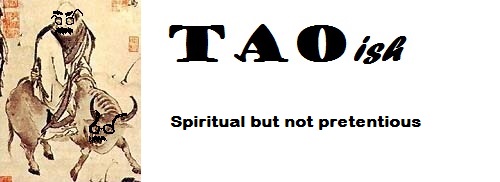Is Daoism Chinese?
Underlying many of the fierce arguments about whether Westerners are appropriating Daoism is a basic question:
is Daoism Chinese?
If not, it’s hard to see how it can be appropriated. But I wager that most Westerners would say yes, Daoism is a Chinese philosophy (or a Chinese religion.)
I would answer this question with a few additional questions.
Is Buddhism Chinese?
Is Zen Buddhism Chinese?
Is Christianity Israeli?
Is Judaism Israeli?
Is the Golden Rule Israeli or Chinese?
Are the Hare Krishna Indian?
Is Stoicism Greek?
Is Existentialism French?
These answers get a lot more complicated. Buddhism started in India, where it is essentially extinct today, and traveled to China several centuries later. Zen Buddhism started in China as Chan Buddhism, a mixture of Daoism and Buddhism which is also essentially extinct. It later morphed into Japan’s Zen Buddhism, which is popular in the West.
Christianity started in what is now Palestine and expanded to modern day Israel, though neither nation existed at the time. (It was all part of the Roman Empire.) The Bethlehem and Jerusalem of Jesus’ day are farther away geographically from the west coast of the United States, and only 300 years less distant chronologically, than the Daoism of the Guodian tomb (the oldest known edition of the Daodejing).
For that matter, the Guodian Daodejing was sealed in the tomb of the tutor to Crown Prince Heng — later King Qingxiang — of the Kingdom of Ch’u, roughly 80 years before China was first unified (in 221 BCE). Strictly speaking, then, Daoism was appropriated by the Chinese from the older Kingdom of Ch’u that it conquered.
In my view, religions are situated in a time and place, which can change or evolve, especially in an evangelizing faith (which Daoism is decidedly not). Nonetheless, the Daoist religion certainly changed and moved to new lands over the centuries. We have no evidence that it existed at all — as a religion –until Zhang Daoling’s vision of a new Daoism led him to create the Way of the Five Pecks of Rice in 142 CE, 500 years after that first known DDJ was written on bamboo strips.
On the other hand, philosophies are timeless and placeless (unless you are dismissing them as outdated historical artifacts). They start somewhere but recur (or are independently created) across the centuries in different lands — sometimes with no knowledge of the earlier effort. The school of Epicureanism was founded in 307 BCE by Epicurus, championed in Rome by Lucretius some 200 years later, and revived by Thomas Jefferson and Jeremy Bentham in the 18th century. Some variation of “seize the day” or “live for today” has arisen at one point or another in nearly every culture
Religions are also organized in a way that philosophies are not. Most have some sort of formal membership, initiation or rituals required to maintain good standing. (This is muddled a bit in the United States, where a large number of self-described Christians are not part of a sect, or even more confusingly, attend a self-described “non-demoninational” church.)
Claiming to be part of a religion without knowing much about it, and ignoring its actual historical sects and precepts, is pretentious and kind of stupid, but it’s not what I would call “appropriating” (unless you form your own religion). And if you aren’t claiming membership in a religion, I don’t see what grounds anyone has to criticize you at all for believing in any philosophy you like.
But most fundamentally, before you can argue that a philosophy or religion has been appropriated, you need to establish who “owns it” in the first place.










